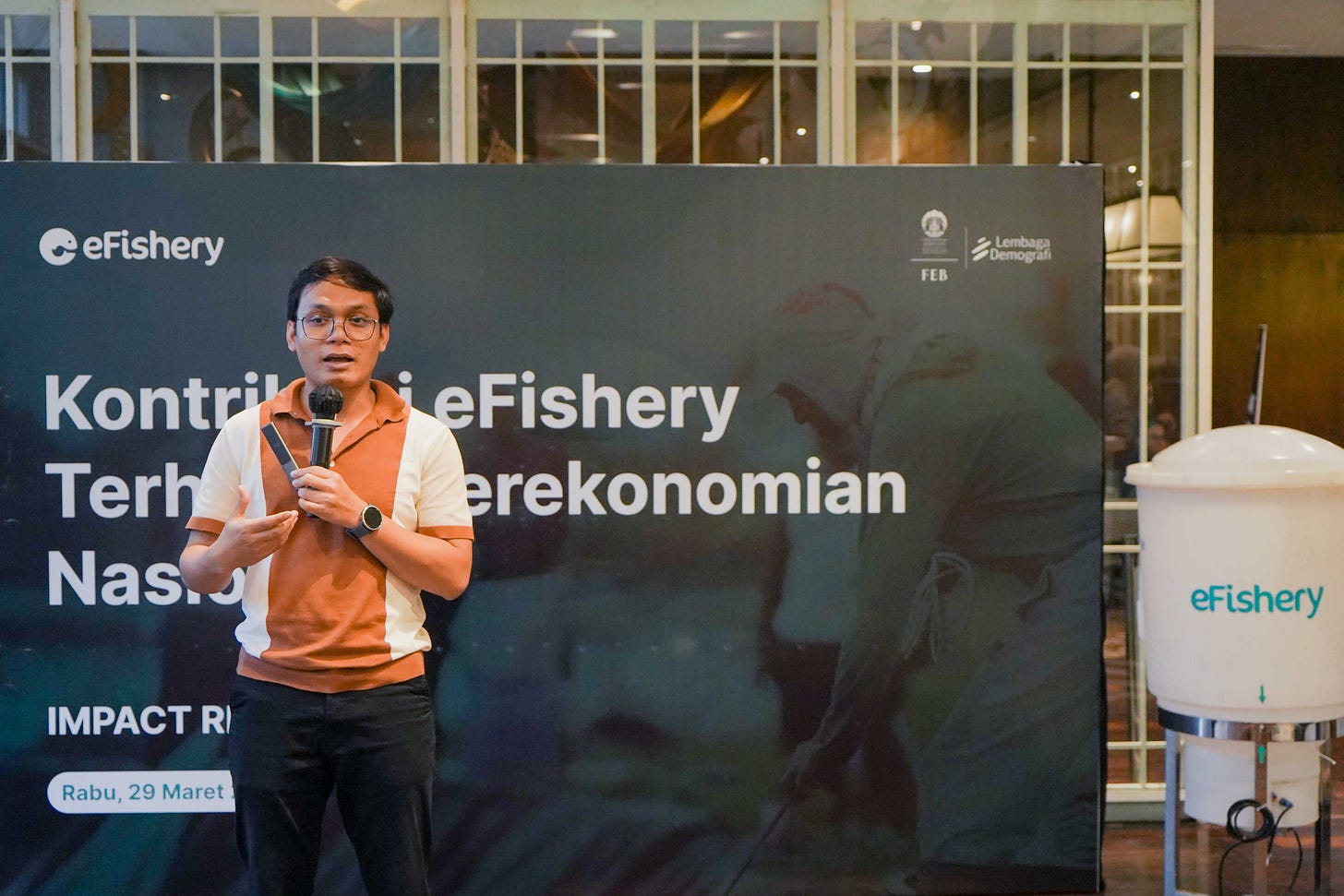Northstar went dental🦷, Google fined 💸, eFishery fraud unfolds🤯, secondary exits trending?
Dear readers,
It’s a long Lunar New Year break here in Indonesia, but we are still excited to share the latest updates from Indonesia’s startup ecosystem based on last week’s key developments.
We also extend our warmest wishes for a prosperous Lunar New Year to those celebrating. May the Year of the Wood Dragon bring us all good fortune, abundant health, endless opportunities, and lasting happiness.
Warm regards,
The DailySocial Team
🚨 What’s New
Here are the most exciting updates from the past week as covered by DailySocial News:
Orange Dental, a dental clinic network startup, raised US$1.5M in seed funding from Northstar Group, following its pre-seed round backed by Init-6, the venture capital firm founded by Bukalapak’s co-founder. Established in 2014, the company currently operates 20 clinics across Greater Jakarta, serving over 45,000 patients annually. CEO Syifail Ramadhana stated that the funding will accelerate the company’s mission to expand access to dental health services.
[Read More]Seaweed startup Banyu secured US$1.25M in seed funding led by Intudo Ventures. Founded in December 2023, Banyu focuses on modernizing Indonesia’s seaweed industry by developing high-quality seedlings, promoting sustainable farming practices, and improving market access for farmers. Their innovative seedling production methods claim to boost harvest yields by 20%, empowering farmers while strengthening global competitiveness for Indonesian seaweed products.
[Read More]Poultry farming startup Chikcin raised US$15M in debt financing from Bank DBS Indonesia to scale its operations and make poultry farming in Indonesia more sustainable. Since 2020, Chikcin has provided an integrated solution for broiler farmers, offering resources like high-quality feed, vaccines, and tech-enabled guidance to enhance productivity.
[Read More]Telkom Group’s CVC arm, MDI Ventures, has invested in Singapore-based cybersecurity firm CYFIRMA, known for its threat intelligence and external threat landscape management solutions. This investment will enhance CYFIRMA’s R&D efforts and expand its presence in Southeast Asia, particularly Indonesia, while also strengthening its global market reach.
[Read More]Lazada, in partnership with SaaS-based insurance provider Peak3, launched a joint venture to build a leading digital insurance ecosystem in Southeast Asia. This initiative aims to deliver innovative, accessible insurance solutions to Lazada’s 160M+ active users and 1M+ sellers, including those in Indonesia.
[Read More]In collaboration with the OJK, IDX, and Ministry of Environment, Indonesia has officially launched its international carbon trading market. Initial trading includes 1.78M tons of carbon credits from various energy projects, supported by mechanisms like the National Registry System and Greenhouse Gas Reduction Certificates to ensure transparency and compliance.
[Read More]
👏 What’s Exciting
#1 Google Fined $12.5M for Monopolistic Practices in the Play Store
Indonesia’s Competition Commission (KPPU) fined Google LLC $12.5M (approx. IDR 202.5 billion) for monopolistic practices related to its Google Play Billing (GPB) policy. Google was found guilty of violating Indonesia's competition laws (Articles 17 and 25 of Law No. 5/1999) by requiring app developers on its Play Store to use GPB. This policy increased service fees to as much as 30%, reducing developers’ revenue and restricting payment alternatives, thereby hindering innovation. Non-compliance resulted in app removals, further reinforcing Google’s dominant position.
This ruling underscores KPPU’s commitment to fostering fair competition in Indonesia’s tech sector. The case follows a similar investigation involving Shopee in 2024, where Shopee was penalized for discriminatory shipping policies. Such regulatory actions emphasize the growing need for tech companies to balance market power with fairness, ensuring an equitable digital ecosystem that benefits businesses and consumers alike.
#2 eFishery Scandal: Financial Misreporting and Leadership Shakeup
The eFishery case has become a cautionary tale for the Indonesian startup ecosystem. An investigation by FTI Consulting revealed significant financial misreporting by the aquatech unicorn. The company inflated its Q3 2024 revenue figures to $752M, while actual revenues were $157M. Similarly, it claimed a profit of $16M, whereas it recorded a $35.4M loss. The scandal also highlighted discrepancies in reported sales of its flagship fish feeder product, which were overstated at 400,000 units compared to the actual 24,000 units sold.
This whistleblower-triggered investigation has led to the resignation of CEO and founder Gibran Huzaifah and CFO Chrisna Aditya, raising concerns over governance in Indonesia’s startup sector. eFishery, once valued at $1.4B, is now under intense scrutiny from investors, including Northstar Group, Temasek, and SoftBank.
The fallout has led to employee protests demanding the reversal of planned layoffs, operational stability, and transparency from management. Additionally, investors like UAE-based G42 have called for more robust corporate governance practices. This case serves as a stark reminder of the importance of rigorous financial audits and ethical leadership in maintaining investor trust and organizational integrity.
🚀 What’s Next: The Strategic Role of Secondary Exits in Indonesia
As Indonesia's startup ecosystem matures, the traditional paths to liquidity—Initial Public Offerings (IPOs) and mergers and acquisitions (M&A)—are facing challenges. Southeast Asia saw only $3 billion raised across 122 IPOs in 2024, while M&A activity remained stagnant at 40–50 deals annually. This slowdown is prompting venture capital (VC) firms to turn to secondary exits as a practical solution to ensure liquidity, maintain returns, and reinvest in emerging opportunities.
A notable example is East Ventures, which recently completed its first secondary transaction led by Coller Capital. This deal provided liquidity to investors in its East Ventures 5 L.P. (EV5) fund, achieving a 2x DPI (Distributions to Paid-In Capital) while retaining shares in key portfolio companies such as IDN Media and Waresix. This strategic move highlights the dual benefits of secondary exits: offering immediate returns to investors while preserving the potential for long-term growth.
Secondary exits are particularly relevant in Indonesia, where sectors like fintech, gaming, and digital infrastructure continue to flourish. For early investors, secondary transactions unlock capital for reinvestment into high-growth startups, ensuring portfolio diversification. Moreover, with favorable macroeconomic conditions such as declining interest rates and an improving regulatory environment, these transactions are becoming not just viable but essential for navigating the evolving startup landscape.
To remain competitive, VCs in Indonesia must adopt secondary exits as a core strategy, ensuring both portfolio sustainability and the ability to capitalize on new opportunities. By embracing this approach, firms can adapt to shifting market dynamics while fostering innovation and growth across the ecosystem.


